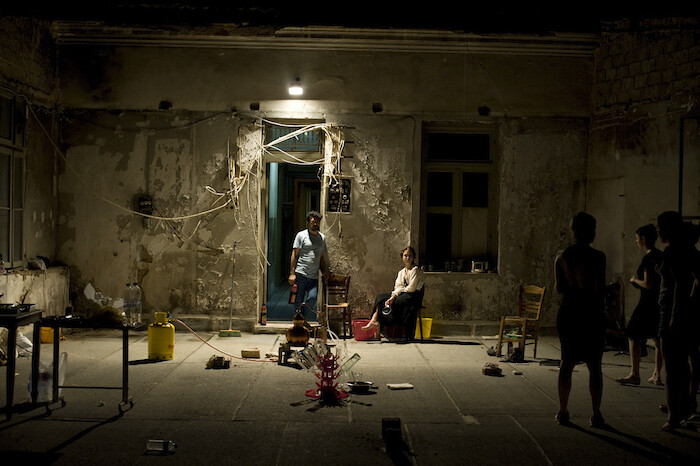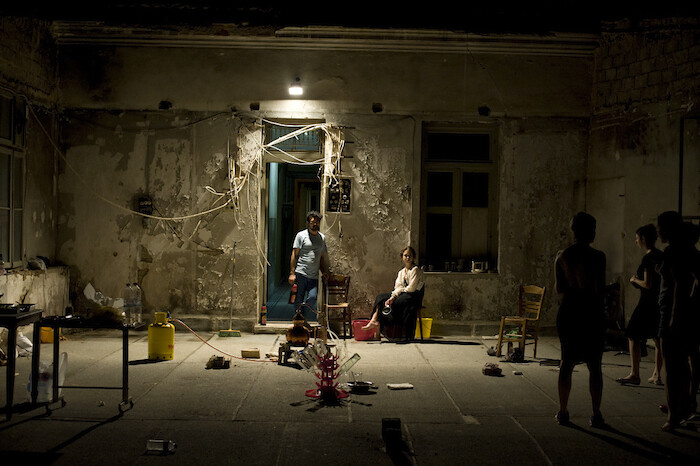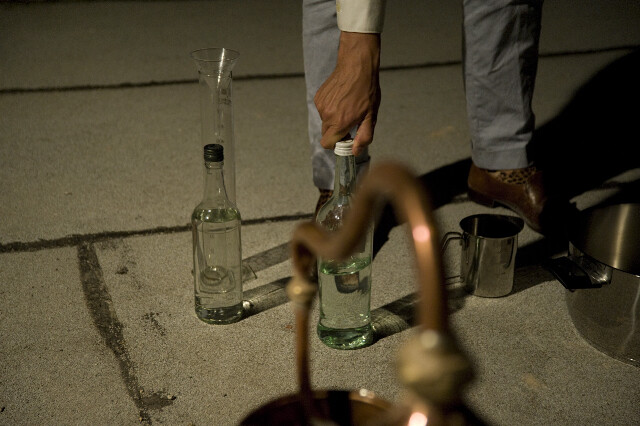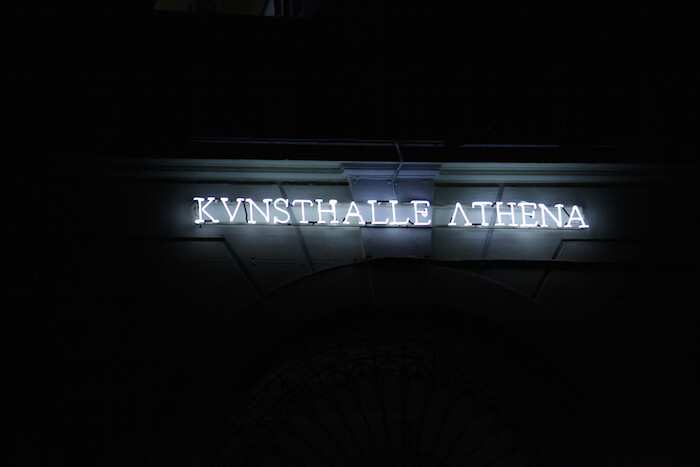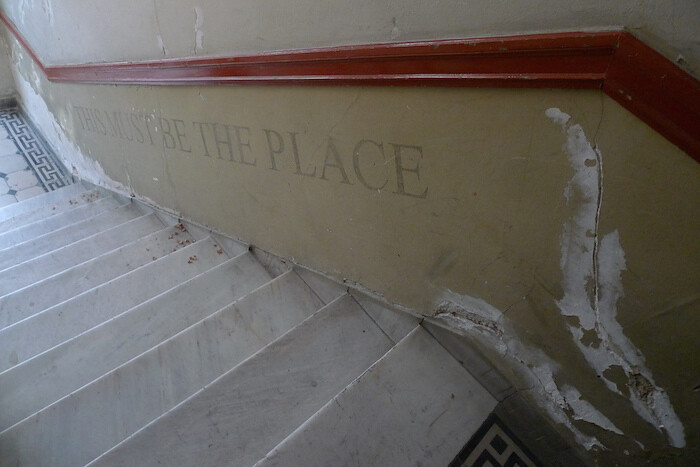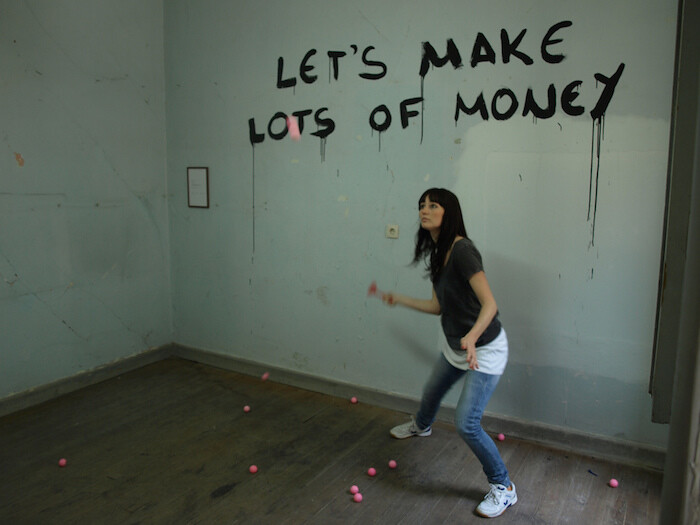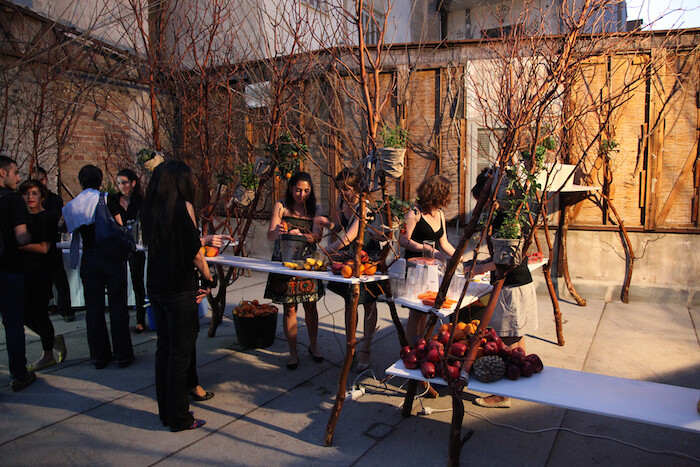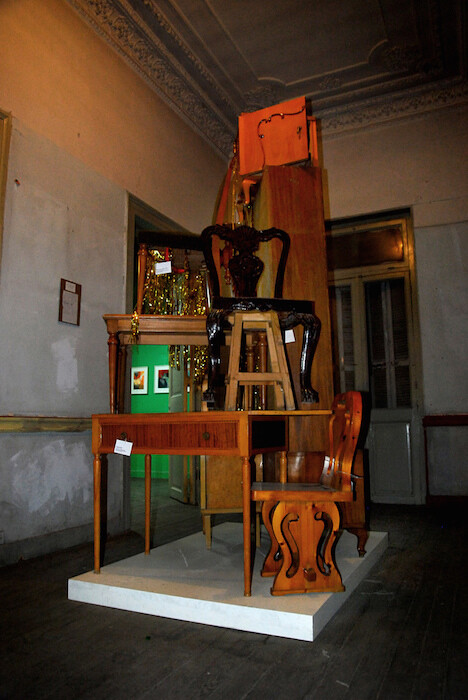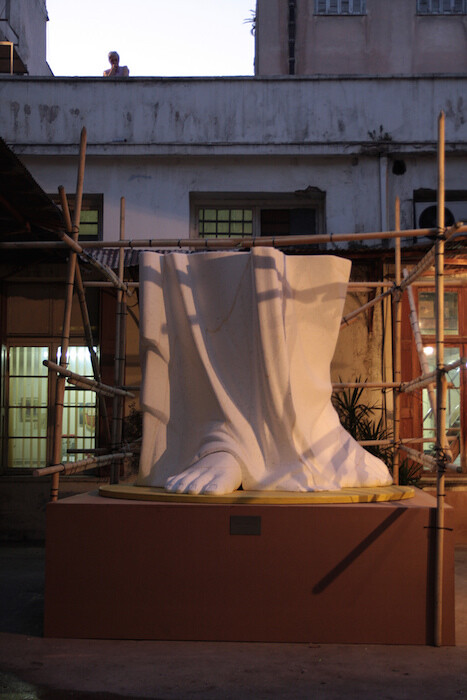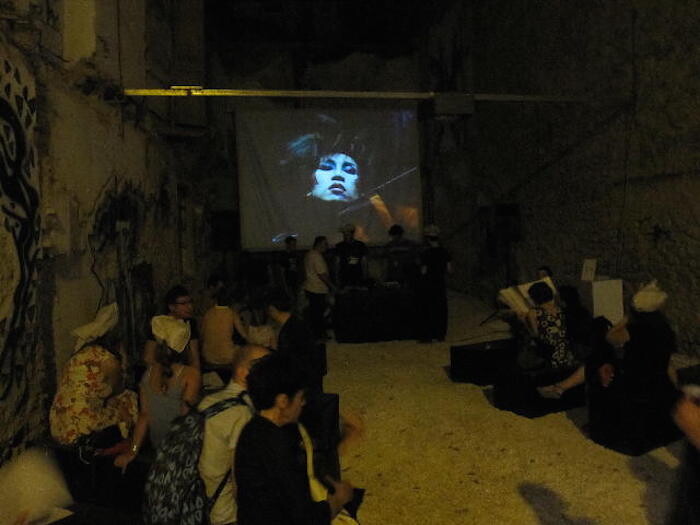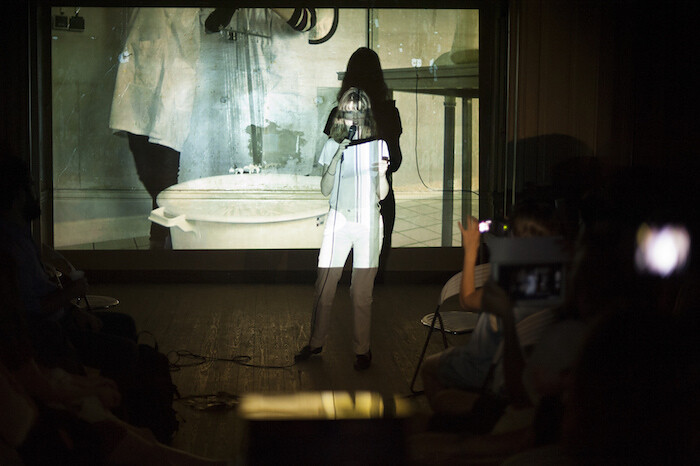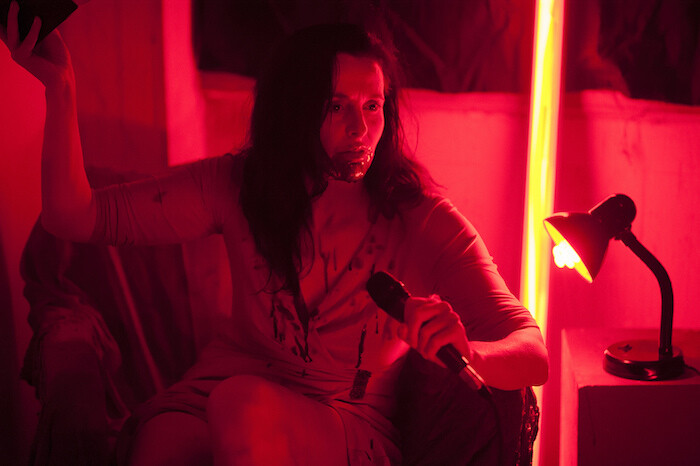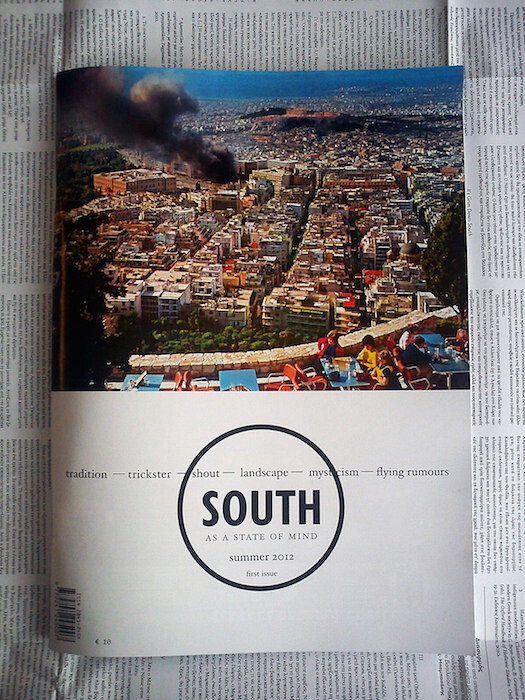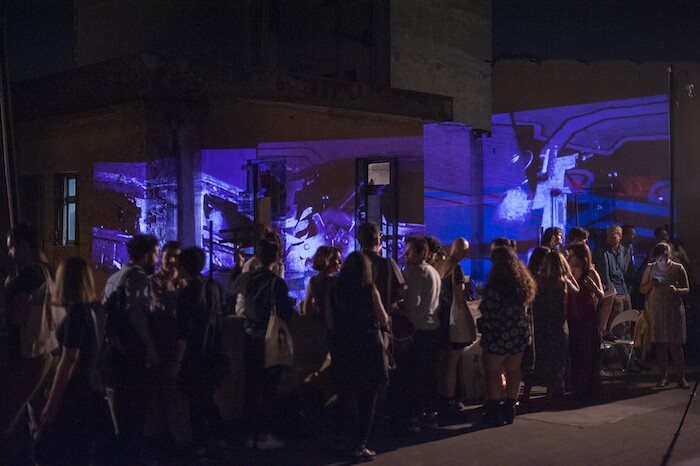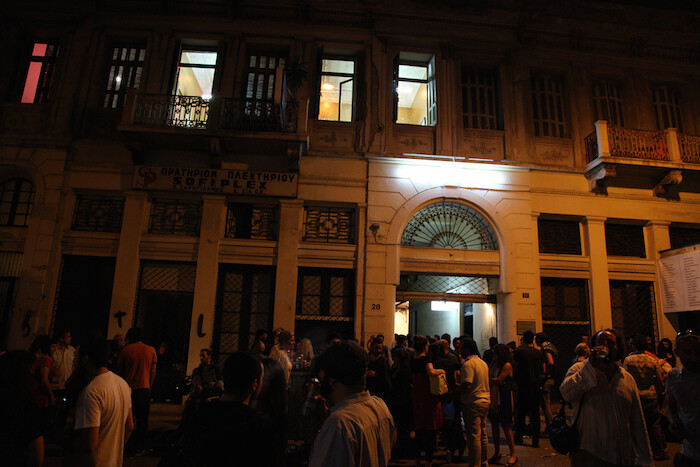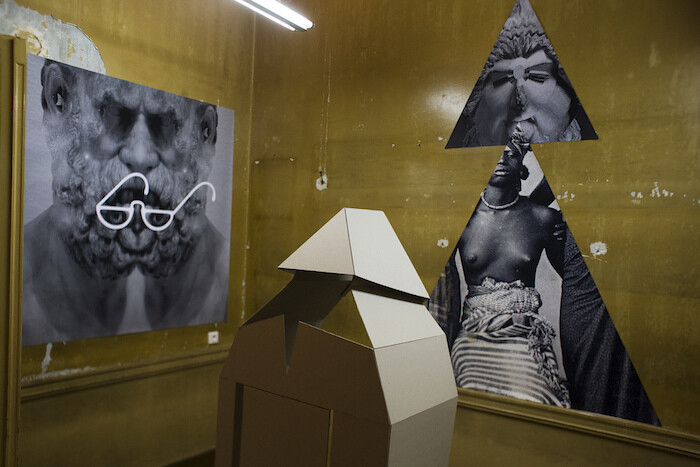You had to be there, I guess. To feel the strange vibes of the re-inhabited derelict neoclassical building, evoking faded grandeur and post-industrial urban decay, from the point of entrance and up the old staircase that leads to the rooms, the corridor, and the terraces. To sense the urgency of a unique event taking place in a unique location that seemed to encompass and transcend its “shoddy” surroundings (brothels, sweatshops, and such) in a “bad” neighborhood on the fringes of the city center. To inhabit for a while—as a privileged guest, not as a cultural tourist—certain spaces of the old town where, for the most part, gentrification processes were indefinitely postponed (abruptly aborted, really) as the whole country was hit hard by severe recession. To hear the echoes of hypnotic loops, sound installations, video projections, and bands sound-checking reverberating across the halls of a magnificent building—abandoned yet totally functional in its new role as an ideal(istic) space for contemporary artistic expression—with several small rooms (a few secret ones, too) and a great outdoors area with patios and courtyards where everyone—from the so-called cultural elite to the anarchopunk refuseniks—gathered in-between shows to chat, drink, smoke, watch a gig or a performance, hear a speech, listen and/or dance to a DJ set, and generally be with each other within “the realm of the ritual,” as a slightly drunk friend once described a Kunsthalle Athena event.
An appropriately intoxicated response, perhaps, if one considers that the Kunsthalle’s first project at this location was entitled “THE BAR” (an event, which took place between May 13-17, 2010, that brought more than a thousand people to a still-unfamiliar destination) and was conceived as a kind of a microsocial “experiment on how to stimulate intellectual exchange and facilitate communication beyond productivity quotas and networking obligations, just for the fun of it.”1 There was an actual bar too, of course.
Subsequently, an artwork that consisted of a distillery unit (not decorative and conceptual but, ultimately, very efficient and productive) was installed in the building’s courtyard. Invocations of higher spirits were there from KA’s inception stage, at that point a nomadic endeavor, during the “ReMap 2” event of June 2009. At the request of artists Ylva Ogland and Rodrigo Mallea Lira, the distillation of an “acropolitic” vodka was “performed” to entice the “Oracle,” which was called upon as the artists declared: “the body is the shelter… my world is the other side of the mirror / welcome to enter through this liquid Kunsthalle Athena.” The initiation had begun.
Kunsthalle Athena eventually found its home in this perennially “unrestored neoclassical house, and took its first steps amid a diverse population of different communities of locals and immigrants—brothel employees, various types of cultural nomads, Chinese merchants, addicts, street artists, and entertainers.”2 Several special projects (large exhibitions as well as a variety of performative and discursive events) were curated/staged in the old building between 2010 (when the first major signs of what would be a long and traumatic financial, as well as psychological/existential, crisis were being painfully manifested) and 2015. Special among these projects was the launching of South as a State of Mind magazine, which was founded by the KA team, and currently acts as the official journal of Documenta 14, which will take place in Kassel, Germany, and Athens in the summer of 2017. The KA’s final project, at the end of last summer, had the decidedly sentimental yet sincerely hopeful title “We’ll Meet Again” (2015), consisting of a three-day event of lectures, screenings, and performances. One of the previous exhibitions was called “This Must Be the Place” (May-August 2013), and another “This is Not My Beautiful House” (May-September 2014), both titles nodding to Talking Heads songs, invoking—unconsciously perhaps, apart from a sense of intense social and existential alienation—some kind of arty, new wave, post punk edge that seemed to guide proceedings and act as a catalyst that brought together different generations of artists, theorists, and art lovers.
Sometimes though, while gazing panoramically at this splendidly diverse crowd, this truly cosmopolitan gathering of local and foreign artists (some of them already famous, others on their way to becoming celebrated regulars of the international art circuit), beautiful scenesters, open-minded academics as well as various other metropolitan tribes in between, an alternative title that springs to mind is of a song by Love called (in part) Maybe the People Would Be the Times, despite its slightly hippy-ish overtones. Freedom, love, interdependency. Those seemed to be the prevailing sentiments around the place, which were inescapable even for those of a more cynical disposition.
The crucial point of the KA projects throughout these last turbulent years, as became evident in the enthusiastic and highly creative participation of the artists as well as the public, was (and still is) how to formulate a new perception of our own lives and actions, a new ontology structured around a newfound sense of community at the crossroads of space, artistic form, and politics. How to involve both the polis (the city as a living entity) and the demos (the people) in a quest for new connections and new references through contemporary artistic practice. Transformation, transgression, transfixion—a means to escape as well as subvert the current state of severe austerity and depression. A labor of love? For sure, but also a love of labor, one might say. From the moment of its inception, Kunsthalle Athena had, for the most part, no permanent source of funding and its existence has been largely the outcome of co-operative action and imaginative use of resources.
And so the old building at the Metaxourgeio-Keramikos area stands abandoned once again, its walls still reverberating from all the voices and the sounds that haunt the premises, along with the trails of every exhibition that took place there over the course of the last five years. Kunsthalle Athena, the initiative of curator and writer Marina Fokidis, left a big mark in the world of contemporary artistic expression in Athens, recasting the curatorial process and creating a blueprint to be followed by the young crowd (artists, students, activists) who left impressed and inspired by the experience. Perhaps the farewell note of the final project last summer should serve as the refrain of an amazing journey: “We are happy to be part of [the building’s] history of habitation, but now it is time leave ‘home’: To leave this dear ruin which acted as a refuge for critical thought and collective or co-operative action, for all of us and you hopefully.”
Editor’s note: subsequent to the writing of this text, Dimitris Politakis became the Greek editor of South as a State of Mind under the editorship of Documenta 14.
Kunsthalle Athena press release for “THE BAR,” 2010.
Kunsthalle Athena press release for “We’ll Meet Again,” 2015.
